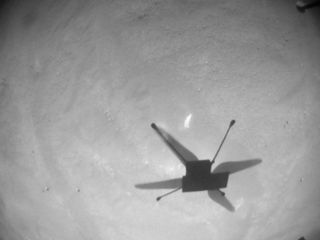NASA's Mars helicopter Ingenuity passes 30 minutes of total air time
The helicopter finished its 17th flight on Dec. 5, and is getting ready for an 18th as soon as Wednesday (Dec. 15).

The first Martian drone has reached the 30 minute air time mark.
After a 117-second Mars sortie on Dec. 5, the total flight time for the Ingenuity helicopter is 30 minutes and 48 seconds after 17 total flights, NASA's Jet Propulsion Laboratory said in a statement on Wednesday (Dec. 15).
There was a delay in releasing the results due to a technical glitch, JPL noted, due to an "unexpected cutoff to the in-flight data stream as the helicopter descended toward the surface at the conclusion of its flight."
Related: Watch Ingenuity Mars helicopter soar in amazing new videos from Perseverance rover
While JPL did get a handful of data packets almost immediately showing the drone was probably doing just fine, it was only on a downlink from Mars Dec. 10 that enough data came through to indicate Flight 17 was successful.
"Ingenuity is in excellent condition," JPL stated, which put the little drone at a go for making its 18th flight this week. Ingenuity, which landed on Mars with NASA's Perseverance rover in February, has been battling normal seasonal changes in the atmosphere that require its rotor to spin a little faster against thinner air, which appears to be working well so far.
The flight plan for No. 18 will see Ingenuity fly 754 feet (230 meters) and reach a top speed of 5.6 mph (9 kph) over 125 seconds. This will bring the helicopter to a new airfield, near the northern boundary of a region named Séítah.
Get the Space.com Newsletter
Breaking space news, the latest updates on rocket launches, skywatching events and more!
Ingenuity's radio range and performance will be tested to an extreme degree on this flight, and as such, engineers decided to have the helicopter communicate back to the Perseverance rover using a low data-rate mode.
"If we do lose radio link on landing, it may be several days or weeks until the line-of-sight between Ingenuity and Perseverance improves enough to attempt a communication session," Teddy Tzanetos, Ingenuity team lead, said in the same statement.
"While delaying our post-flight data analysis is an inconvenience, it is not unexpected and becoming the new normal as we continue to operate in challenging terrain in the weeks ahead."
Follow Elizabeth Howell on Twitter @howellspace. Follow us on Twitter @Spacedotcom or Facebook.
Join our Space Forums to keep talking space on the latest missions, night sky and more! And if you have a news tip, correction or comment, let us know at: community@space.com.

Elizabeth Howell (she/her), Ph.D., is a staff writer in the spaceflight channel since 2022 covering diversity, education and gaming as well. She was contributing writer for Space.com for 10 years before joining full-time. Elizabeth's reporting includes multiple exclusives with the White House and Office of the Vice-President of the United States, an exclusive conversation with aspiring space tourist (and NSYNC bassist) Lance Bass, speaking several times with the International Space Station, witnessing five human spaceflight launches on two continents, flying parabolic, working inside a spacesuit, and participating in a simulated Mars mission. Her latest book, "Why Am I Taller?", is co-written with astronaut Dave Williams. Elizabeth holds a Ph.D. and M.Sc. in Space Studies from the University of North Dakota, a Bachelor of Journalism from Canada's Carleton University and a Bachelor of History from Canada's Athabasca University. Elizabeth is also a post-secondary instructor in communications and science at several institutions since 2015; her experience includes developing and teaching an astronomy course at Canada's Algonquin College (with Indigenous content as well) to more than 1,000 students since 2020. Elizabeth first got interested in space after watching the movie Apollo 13 in 1996, and still wants to be an astronaut someday. Mastodon: https://qoto.org/@howellspace
